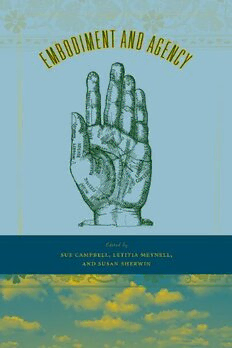Download Embodiment and Agency PDF Free - Full Version
Download Embodiment and Agency by Sue Campbell, Letitia Meynell, Susan Sherwin (editors) in PDF format completely FREE. No registration required, no payment needed. Get instant access to this valuable resource on PDFdrive.to!
About Embodiment and Agency
Themes of embodiment and agency have long been central to feminist philosophical thought and have increasingly led feminists to extend their theorizing to encompass a range of identities shaped by processes of gender, race, class, disability, and sexuality. The intersection of these themes, however, has often been limited to analyzing how specific modes of socialized embodiment can be impediments to agency or autonomy. Embodiment and Agency is distinctive in bringing a remarkable range of theoretical perspectives and resources to the project in ways that stress possibilities as well as constraints. Contributors utilize, for example, phenomenology, psychoanalysis, care ethics, analytic philosophy, Hegelian critique, and postcolonial theory to examine embodiment and agency in contexts ranging from a child's struggle to find her own identity to global politics. The volume is integrated through its theme, through an introductory essay situating the contributions in relation to each other and to current feminist theory on agency, and through the structuring of the contents into two distinct sections.Part I, Becoming Embodied Subjects, explores how we become individually and collectively identified subjects through the possibilities for agency that arise from specific modes of embodiment. Part II, Embodied Relations: Political Contexts, continues the theme of embodied agency in contemporary sociopolitical contexts. It challenges the reader to reconceptualize the links between embodiment and moral agency in ways adequate to political realities, personal relationships, and collective responsibilities.
Detailed Information
| Author: | Sue Campbell, Letitia Meynell, Susan Sherwin (editors) |
|---|---|
| Publication Year: | 2009 |
| ISBN: | 9780271035222 |
| Pages: | 142 |
| Language: | English |
| File Size: | 13.058 |
| Format: | |
| Price: | FREE |
Safe & Secure Download - No registration required
Why Choose PDFdrive for Your Free Embodiment and Agency Download?
- 100% Free: No hidden fees or subscriptions required for one book every day.
- No Registration: Immediate access is available without creating accounts for one book every day.
- Safe and Secure: Clean downloads without malware or viruses
- Multiple Formats: PDF, MOBI, Mpub,... optimized for all devices
- Educational Resource: Supporting knowledge sharing and learning
Frequently Asked Questions
Is it really free to download Embodiment and Agency PDF?
Yes, on https://PDFdrive.to you can download Embodiment and Agency by Sue Campbell, Letitia Meynell, Susan Sherwin (editors) completely free. We don't require any payment, subscription, or registration to access this PDF file. For 3 books every day.
How can I read Embodiment and Agency on my mobile device?
After downloading Embodiment and Agency PDF, you can open it with any PDF reader app on your phone or tablet. We recommend using Adobe Acrobat Reader, Apple Books, or Google Play Books for the best reading experience.
Is this the full version of Embodiment and Agency?
Yes, this is the complete PDF version of Embodiment and Agency by Sue Campbell, Letitia Meynell, Susan Sherwin (editors). You will be able to read the entire content as in the printed version without missing any pages.
Is it legal to download Embodiment and Agency PDF for free?
https://PDFdrive.to provides links to free educational resources available online. We do not store any files on our servers. Please be aware of copyright laws in your country before downloading.
The materials shared are intended for research, educational, and personal use in accordance with fair use principles.

